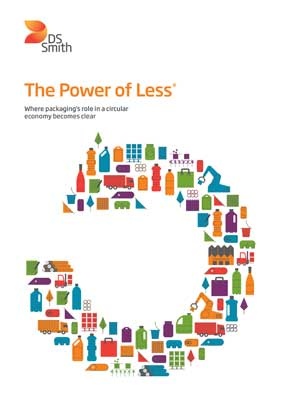Report highlights packaging’s role in the circular economy
 Corrugated and plastic packaging recycler DS Smith yesterday (3 March) launched a report into the role packaging can play in the circular economy.
Corrugated and plastic packaging recycler DS Smith yesterday (3 March) launched a report into the role packaging can play in the circular economy.
‘The Power of Less: Where Packaging’s Role in a Circular Economy Becomes Clear’ also highlights how moving from a linear supply chain to a circular one can deliver business benefits including lower costs, less waste, more sales and managed risk.
A design-led solution
The report highlights how the solutions to managing packaging in the supply change lie with designing them to be more ‘circular’ so that they can flow through existing recovery mechanisms better. The report notes that ‘packaging designers need to find the balance to create packaging that does the job with the least amount of material, energy and space but should also be fully recyclable and become the base material for the next supply cycle’.
According to the report, the case for the packaging industry to go circular ‘is easy to make – just follow the figures’: global packaging sales are expected to reach US$975 billion (£635.5 billion) by 2018, yet many billions of pounds of packaging are still wasted. And, according to the World Economic Forum, adopting circular business models could save businesses US$1 trillion (£652 billion).
As such, the report advocates a ‘strategic and systematic’ approach to stop wastage leakage points in packaging supply chains, and includes case studies and interviews with ‘key industry players’ to help businesses achieve circularity.
Within the report there is information on:
- a Marks & Spencer case study looking at the retailer’s programme to ‘optimise’ all transit cartons coming into the UK with the potential to generate cost savings of around £1.5 million a year;
- an infographic demonstrating how brands including Unilever and Walmart saved money and cut carbon emissions with ‘strategic’ packaging; and
- a six-month checklist for achieving a circular approach to packaging throughout the supply cycle.
‘Packaging has never been more relevant’
DS Smith Chief Executive Miles Roberts said: “Long, convoluted supply chains are traditional in a multi-channel retail environment that seems to be getting bigger, faster and more competitive by the minute. Globalisation, fuelled by digital and mobile technology, coupled with fierce customer demands for quality of service, is placing product manufacturers, suppliers and retailers under intense market pressure to deliver the goods – literally.
“In this environment, packaging has never been more relevant, and the benefits of a strategic and sustainable packaging solution that can lighten the load never more attractive.”
Dr Adam Read, Practice Director for Resource Efficiency and Waste Management at Ricardo-AEA, added: “The packaging industry must work both upstream with manufacturers and downstream with consumers to promote better design. Not just lightweighting, but material substitution and simplification to make disassembly and recycling easier.”
DS Smith Sustainability Director Mark Greenwood added: “The most sophisticated packaging buyers are already recognising the value of end-of-life recovery as a materials sourcing solution, not a waste management problem.”
The corrugated and plastic packaging recycler is currently undergoing a period of expansion after purchasing the Recycling Division of Middleton Paper for an undisclosed sum in October 2014 and is set to acquire rival Duropack from CP Group 2 BV, a One Equity Partners (OEP) subsidiary, for approximately €300 million (£220m).
Read ‘The Power of Less: Where Packaging’s Role in a Circular Economy Becomes Clear’ report.




